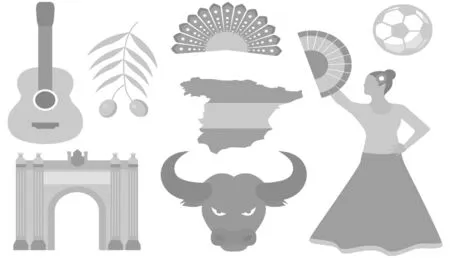Surprising Customs from Around the World世界各地的奇风异俗
2022-08-31克里斯蒂娜本顿曾敏月
文/克里斯蒂娜·本顿 译/曾敏月
By Christine Benton
We’ve all heard that it’s a small world, but is it really? People have such different lifestyles that what feels like a customary practice to some may seem bizarre to others. People have a propensityto develop traditions and customs around everything from beauty rituals to eating habits. This has led to a world enriched with thousands of different cultures since the dawn of civilization. Cultural differences abound,and the following are eight surprising examples.
1. People in Malaysia use their thumb to point
我们都听说过“这世界很小”这句话,但是,世界真的很小吗?人们的生活方式千差万别,一些人觉得习以为常的做法,另一些人却直叫稀奇古怪。从护肤程序到饮食习惯,人们在生活的方方面面都容易形成传统和习俗。这就是为什么自文明诞生之日起,世界就有着千千万万、多姿多彩的文化。文化差异比比皆是。下面,一起来看看世界上的八个奇风异俗吧!
1. 马来西亚人用大拇指示意
在一些国家,人们认为用食指指指点点是非常粗鲁无礼的。在许多文化中,无论从字面义(用手指指)还是比喻义(指责)上看,这一行为可能都不太文雅;而在某些国家,比如印度尼西亚和马来西亚,这种手势会被视为极大的冒犯。如果是要指东西,用拇指更礼貌些,也更能让人接受。在许多非洲国家,手指只能指向无生命的物体,不能指人。
Some countries regard pointing with the index finger as rude and abrasive.While members of many cultures probably think that pointing a finger, both literally and figuratively, isn’t very nice,in some countries, e.g., Indonesia and Malaysia, this gesture is seen as incredibly offensive. Instead, it is considered more polite and acceptable to gesture towards things with the thumb. In many African countries, pointing is reserved for inanimateobjects only, not people.
2. Nicaraguans point with their lips
While hand gestures vary with cultural differences, few countries can lay claim to gestures made by contortions of the mouth. However, in Nicaragua, it is common to point with the lips instead of the thumb or index finger. Wondering how exactly this is done? It all starts by puckering upin a kind of duck face.The lips can then be directed forward or side-to-side to indicate what the person is trying to point out. The lip-point gesture is accompanied by a directional head movement and is typically used when conversing to indicate something happening nearby.
3. The French really go in for5go in for对……感兴趣或喜欢。 kissing
Pretty much every culture has specific greeting rituals. Romance and Latin American cultures share the common custom of kissing on the cheek as a form of salutation. However, the French have taken this to a whole new level. For instance:
● Kissing rules vary for men and women.
● The number of kisses required to complete the greeting varies from region to region.
2. 尼加拉瓜人用嘴示意
虽说由于文化差异,各个国家的手势五花八门,但是,几乎没有哪个国家会说他们是靠扭动嘴巴示意。然而,在尼加拉瓜,人们还真就习惯用嘴唇而不是拇指或者食指来指东西。想知道尼加拉瓜人到底是怎么做出“嘴势”的吗?首先要噘起“鸭子嘴”。之后就可以将嘴唇向前努或向两侧扭,以表明想要指的是什么。尼加拉瓜人在做这种“嘴势”时,头也会跟着同向移动。通常该动作用来在交谈中指示附近的事物。
3. 法国人真的很喜欢亲吻
几乎每种文化都有特定的问候礼仪。罗曼语文化和拉美文化有一个共同的习俗,那就是将亲吻脸颊作为一种问候方式。然而,法国人可谓把亲吻礼贯彻到了一个全新的高度。例如:
·男性和女性有不同的亲吻规则。
● The French people are expected to kiss-greet each person arriving at a gathering, whether they know them or not.
4. Nigerians kneel or prostrate themselves when greeting
Members of the Yorubatribe, an ethnic group in Nigeria, take greeting rituals seriously, especially regarding greeting elders. When an adult is approaching, it is customary for young people to greet them by dropping to their knees. To be more specific, women kneel, and men prostrate themselves.These traditional gestures are signs of deference and respect for the elders in the community. Other ethnic groups in Nigeria do not engage in this custom.
5. People spit on the bride at Greek weddings
Spitting in Greek cultures is regarded as a good luck charm to ward offthe devil. Spitting is also done as a way to ward off evil when engaging in regular conversations. Today, the custom doesn’t involve wedding guests actually spitting on the bride. Instead of inflicting damage on the bridal gown, it has evolved into the more hygienicand symbolic act of guests forcefully uttering verbal spitting “ftou ftou ftou.”Greeks also do this on other special occasions such as baptisms to acknowledge the baby’s good health and beauty.
·完成问候仪式所需亲吻的次数因地区而异。
·要亲吻问候聚会上的每一个人,不管认不认识。
4. 尼日利亚人打招呼行跪拜礼
约鲁巴族是尼日利亚的一个民族,非常重视问候礼仪,问候长辈时尤其如此。按照习俗,在有年长者走近时,年轻人要跪拜。说得再具体点,是女子下跪,而男子拜倒。这些传统姿势表达了对族内长者的尊重。尼日利亚的其他民族没有这种习俗。
5. 希腊婚礼上新娘要被吐口水
在希腊文化中,人们认为吐口水是护身符,能够驱魔辟邪。日常交流中,希腊人也会吐口水,以驱逐厄运。现如今,婚礼宾客不会真的往新娘身上吐口水。这个习俗已经演变为更加卫生的行为,宾客象征性用力发出吐口水的声音“ftou ftou ftou”,这样就不会把新娘的礼服弄脏。在很多其他特殊场合,希腊人都会这么做。例如在洗礼仪式中,人们会以此来表示宝宝健康又漂亮。
6. In Russia, September 12 is known as the day of conception
Cultures typically approach marriage, sex, and reproduction in unique ways. Russia may take first prize in terms of institutionalized acceptance of a custom. This came about because of serious concerns over Russian society. Russia has declining birth rates, an unequal proportion of women to men,and alarmingly short male lifespans.To help solve this issue, the Russian government instituted a public holiday on September 12 to give couples time offfrom work to have sex, which will hopefully result in a pregnancy. Prizes are given out to those successful parents whose babies are born approximately nine months later.
7. The Danes hang out in cemeteries
6. 俄罗斯的“怀孕日”9月12日
在对待婚姻、性和生育的问题上,各文化有其独特的方式。说到习俗制度化,可以说没有哪个国家能比得上俄罗斯。这是出于对俄罗斯社会问题的担忧。俄罗斯的出生率正在下降,男女比例不平衡,且男性寿命短得惊人。为解决这一问题,俄罗斯政府将 9 月12 日设为法定节假日,让已婚男女放假,回家“造娃”。大概九个月过后,如果有宝宝降生,这些“造娃”成功的父母就可以获得奖励。
7. 丹麦人在墓地流连
墓地在许多国家的民间故事中都是令人毛骨悚然的场所,但在丹麦并非如此。作为一个务实的民族,丹麦人不在公园里扎推,而是将墓地变成了社交场所。墓园里的一草一木都经过精心修剪。当冬天过去,天气回暖时,当地人便纷纷来到墓地。在丹麦首都哥本哈根,闲逛时会遇到很多名人,因为这里的墓地安葬着不少丹麦名人,包括童话作家安徒生。
Cemeteries are spookyfolklore sites in many countries, but this is not the case in Denmark. Instead of gathering in parks, the Danes (a pragmatic people) have converted their cemeteries into socializing areas. Danish cemeteries are well manicuredand thronged withlocals when the weather begins to warm up after winter. In Copenhagen,the country’s capital, you’ll be hanging out in great companyas many famous Danes are buried there, including Hans Christian Andersen.
8. The Japanese enjoy slurping
Most cultures have rules about table etiquette. In western societies, noisily consuming food is considered rude.However, in Japan, making slurping sounds while eating is acceptable. This probably has something to do with the way noodles are eaten. In western countries, you twirl your noodles on a spoon or fork before putting them in the mouth. The Japanese simply slurp up their noodles without winding them around a utensil. This way of noodle eating is naturally noisier. Making slurping sounds when eating noodles in Japan indicates that you’re really enjoying them. Some people even state that slurping lets air into the palate and enhances the noodles’ flavor. ■

8. 日本人吃面喜欢嗦着吃
大多数文化中都有餐桌礼节。在西方国家,用餐时发出声音是很粗鲁的行为。然而,在日本,吃面时是可以发出“嗞溜嗞溜”声的。这可能与他们吃面条的方式有关。西方人吃面时把面条绕在勺子或叉子上再送入口中。但日本人不会把面绕在餐具上,他们是直接将面吸入口中。这种吃面的方式自然会制造出比较大的声响。在日本,如果吃面时发出嗞溜声,就表示你真的很享受其中的美味。有些人甚至说,嗦面能把空气吸进嘴里,让面条更具风味。 □
